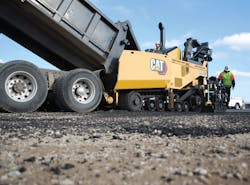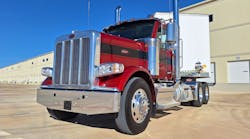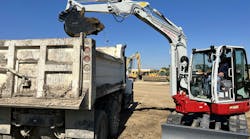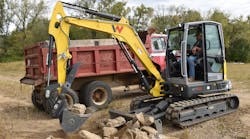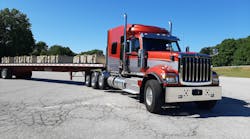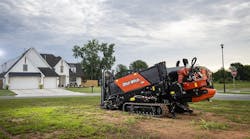One way large asphalt paver manufacturers have been pushing through the pandemic is by adding technologies to help managers produce better mats—and using those technologies is just one of the operating cost-savings strategies available to equipment managers.
How to lower paver costs
Keys to lowering paver operating costs include training, using fuel-saving operating modes, paver cleaning, and preventive maintenance.
“Optimizing machine performance enables contractors to work more efficiently and keep ownership costs lower,” says Caterpillar’s Jon Anderson, asphalt paver sales support consultant. “Training operators and service personnel on machine capabilities, proper paving techniques, and important service requirements are keys to efficient operation, wear reduction, and lower fuel consumption.”
Operating techniques also play a part.
“Proper techniques such as keeping the auger chamber filled with the proper amount of material helps limit wear on the conveyors and augers, while enabling machine hydraulics, electrical, and engine systems to perform more efficiently,” Anderson says.
Caterpillar pavers feature an ECO operating mode that can contribute to fuel savings, Anderson says.
“Operating in advanced ECO mode helps save fuel while still delivering the required power for optimal machine performance. A common misconception is that fuel-saving ECO mode is a trade-off for high-production performance,” Anderson says. “In reality, Cat pavers are designed to provide optimal power and peak torque performance while operating in ECO mode. If conditions exist for higher engine speeds, the system automatically adjusts to meet those requirements.”
Kyle Neisen, product director, construction machinery solutions, Astec Industries (Roadtec), also stresses maintenance and finding potential problems before they cost money.
“Perform preventative maintenance and keep machines clean,” he says. “Nothing can prevent more headaches and save more money than preventative maintenance. Additionally, keeping a machine clean not only prevents damages, but also helps you spot leaks or other issues earlier before they become significant issues.”
Before buying a tracked or wheeled asphalt paver, equipment managers should weigh a number of questions and scenarios, according to OEMs.
“There are a lot of factors managers should consider: type of work to be done, dealer support, crew comfort, and machine availability are a few of the first that come to mind,” Anderson says.
“The work to be done may help them decide if a mobile track or wheel paver would be best,” he continues. “Rubber-track pavers provide excellent flotation and traction on softer base materials, while rubber tire machines offer smooth operation on mill-and-fill applications.
“It should be noted that both rubber track and rubber tires are able to perform well on a variety of base materials and that personal preference is a big factor when choosing which style of undercarriage that contractors choose,” Anderson says.
“Application type is another consideration when choosing a paver. Pavers equipped with screeds that utilize front-mounted extenders perform well on urban streets and parking lots where obstacle avoidance is a key factor,” Anderson says. “These types of screeds provide a shorter footprint that enables the screed to work closer to curbs, storm drains, and other barriers.”
Rear-mounted extenders can help managers complete larger jobs.
“Screeds equipped with rear-mounted extenders provides a larger footprint and are very stable for high-production highway and interstate applications,” Anderson says. “Again, it should be noted that both screed types can perform well in a variety of applications; careful planning and best paving practices are key to successful performance.”
Dealer support for asphalt pavers
“Cat dealers offer an extensive footprint that enables 24/7 support,” Anderson says. “They offer parts support, training solutions, machine rentals, and financial incentives that help contractors stay profitable. From training on how to use the paver, minimizing downtime with fast repairs, efficient off-season rebuilds, and critical parts availability, the dealer can positively impact many aspects of the ownership experience.”
Managers should also look at the comfort of their paving crews.
“Crew comfort is also a difference maker,” Anderson says. “Pavers that are quiet, direct heat and fumes away from the crew, and provide simple operation can enable crews to work more efficiently.
“Machine availability is another important consideration and is often impacted by reliability, daily maintenance requirements, fast screed heat-up times, and scheduled maintenance requirements,” Anderson says. “Many contractors prefer a paver that is ready to start paving as soon as the crew arrives.”
Roadtec’s Neisen says managers are seeing increased technology with the paving crews in mind.
“Contractors considering a new paver purchase are often interested in the total cost of ownership, as well as the ability to maximize uptime,” Neisen says. “In recent years, we’ve noticed increased emphasis on emerging technologies as well as features that focus on the comfort and safety of the crew.”
Some of the latest technology in asphalt paving involves mat quality.
“Thermal mapping is one of the current technologies developed for Cat Pavers,” Anderson says. “Thermal mapping helps drive consistency for better quality and longer lasting roads. Thermal segregation is one of the leading causes of road failure in the asphalt paving industry. Thermal variations leave uneven surface textures behind the screed.
“These variations cool more quickly and can lead to less than ideal compaction results and shorter life expectancy of the paved surface,” Anderson says. “Early detection of thermal variation enables timely process control adjustments to be made. To combat these variations, contractors can monitor surface temperatures of the asphalt utilizing an infrared camera and a Global Navigation Satellite System (GNSS) enabled by RTK accuracy.
“Viewing real-time temperatures, contractors can identify variations and take action to manage the plant to paver delivery process and fine-tune paving practices for more uniform laydown temperatures,” Anderson continues. “Thermal mapping utilizes an infrared camera mounted on a robust, fixed-position mast. The camera captures the entire width of the asphalt surface behind the screed. An LCD display mounted near the screed console provides real-time visibility to the surface being monitored and the data is automatically recorded and stored for future analysis.”
Anderson says another goal is having paver technology work with roller technology.
“Combining the paver’s thermal mapping technology with the asphalt compactor’s compaction control system provides a unique communication tool that helps contractors optimize the paving train for more profitable job site management,” he says.
As with other machinery categories, Covid-19 has impacted asphalt paver demand and sales. Manufacturers and contractors alike hope the incoming Biden administration will be able to pass a long-term infrastructure bill. But some manufacturers are holding their own.
“It has been an unusual year for the entire world, and the construction industry is no different,” Neisen says. “All things considered, we are happy with where our sales are right now.”
An old name will shortly be rejoining the paver market. Last year, Volvo CE agreed to divest the North American Blaw-Knox paver business and associated assets to asphalt plant manufacturer Gencor Industries. Volvo pavers had continued to carry the Blaw-Knox logo on equipment in the U.S., but under Gencor, the brand will have new emphasis.
The Blaw-Knox business and associated assets will shift to Gencor, including the transfer of the manufacturing production line currently located in Shippensburg, Pennsylvania. Gencor has announced that they plan to continue manufacturing the Blaw-Knox paver line in Pennsylvania and move to a location in Letterkenny Township.
Gencor has also announced that it will continue marketing and servicing the Blaw-Knox paver line through selected Volvo CE dealers in North America. Blaw-Knox made its first road paving equipment in 1929, and the brand has since gone on to build equity in the paving segment in North America.
“With our already strong position in the asphalt industry, this acquisition will afford Gencor access to the venerable brand of Blaw-Knox and provide an entry into the hot-mix paver segment,” says Marc Elliott, president and director of Gencor. “We are committed to the long-term growth and development of the Blaw-Knox brand.”
